
- Все
- Детская и образовательная литература
- Детская художественная литература
- Современная детская литература
Бесплатный фрагмент - The Kind Cow
New fairy tales and fairy stories
The Hen and her Careless Chicken
Once upon a time there was a hen. Every day she went for a walk with her chickens and picked food. When she find a seed, a worm, or a caterpillar, she called the chickens. They resorted to the hen, watched carefully, memorized, learned. Only one chicken was not interested – he was running for butterflies or lying in the sun-basking. The hen was angry at the careless chicken, but the chicken did not care: he knew that the mother would feel sorry for him and bring something to peck at by the evening.
One day the hen went out with her neighbors, and she was gone all day. When her chickens start to want a lunch, they ran around the yard: someone found a grain, someone found a worm, someone found a caterpillar: all the chickens ate. And the careless chicken saw a twig, took it for a worm and greedily pecked, so that the twig stuck across the beak. It was a shame for the chicken to run around the yard like this: he hid in the chicken coop and began to cry bitterly.
In the evening, the hen came, found him, took out a twig from the beak and did not scold. She called him into the yard and began to show him a grain, a worm and a caterpillar. And the chicken walked near the hen, watched carefully and learned.
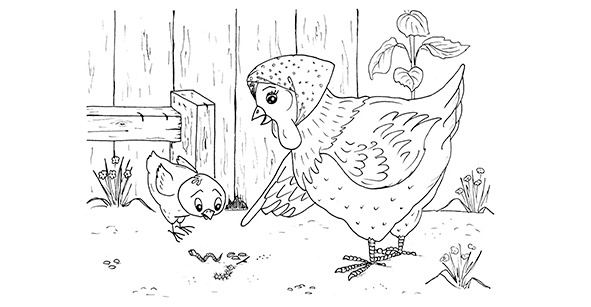
The Story of the Melon Named Melany
Peter’s grandmother had melons in her garden, a whole patch of them. One melon was called Melany, and the others had no names. Every day a worm crawled past the patch of melons. The worm’s name was Semyon Semyonitch. In the morning Semyon Semyonitch crawled from the fence into the depths of the garden and said: “What nice melons! When you grow up I’ll eat you.” In the evening he crawled back and said in his manner: “Well? Have you grown up? I’ll eat you!”
All the melons were afraid of this worm, they trembled, everything inside them shrank, and only when the worm crawled away, the melons sighed with relief: “Whew…”
Only Melany wasn’t afraid of the worm: she looked through him at the next patch, where the pumpkins grew, and thought about something of her own.
At the end of the summer, Peter’s grandmother began to harvest. “Well, melon, smooth back, round sides, will you give us some sugar?” she said at the melon patch and put some melons in the bag, including Melany.
Petya with his grandmother and guests began to try melons: one was hard, the other was hard and sour, the third was also tasteless, and only Melany was soft, juicy and sweet from the middle to the crust.
Peter ate a melon and praised: “What a melon! Yummy!” And the other melons were given to the pigs: the pigs will eat everything.
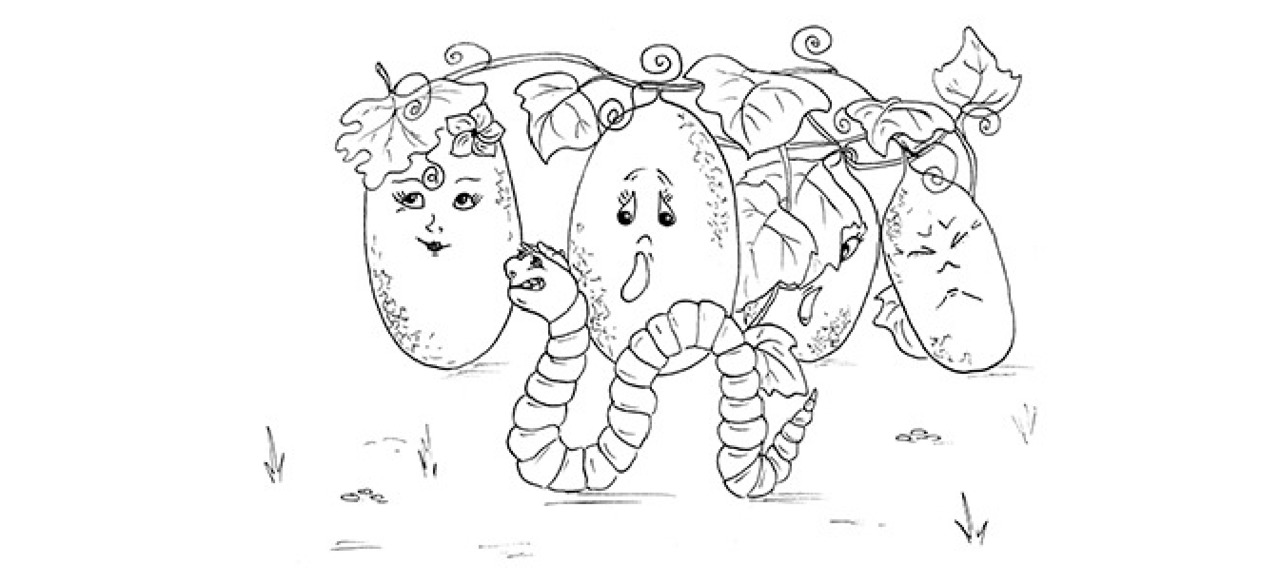
About the Kind Cow and the Little Frog
Once upon a time there was a cow. She had large round sides, large udders, a long tail, and kind eyes. The udder was filled with delicious milk twice a day, and the long tail helped to ward off midges and horseflies. The cow also had large horns, but this did not frighten anyone: the cow was very kind and butted only in extreme cases.
The cow was walking in the meadow and eating the juicy grass. One day she saw a small green frog in the grass.
“Who are you?” asked the cow.
“I am a little frog,” said the frog.
“What are you doing here?” asked the cow.
“I played, played, I jumped, jumped, and I got lost,” said the frog, and he began to cry.
“Don’t cry,” said the cow. Do you know where your home is?
“I don’t know,” said the frog, “it’s somewhere near the river… There are big reeds there…”
There was tall grass all around, and the buzzing and chattering of various insects made it difficult for the frog to see a familiar place and hear its native croaking.
The cow tilted her big-horned head and said:
“Get on my back, we’ll look for your house.”
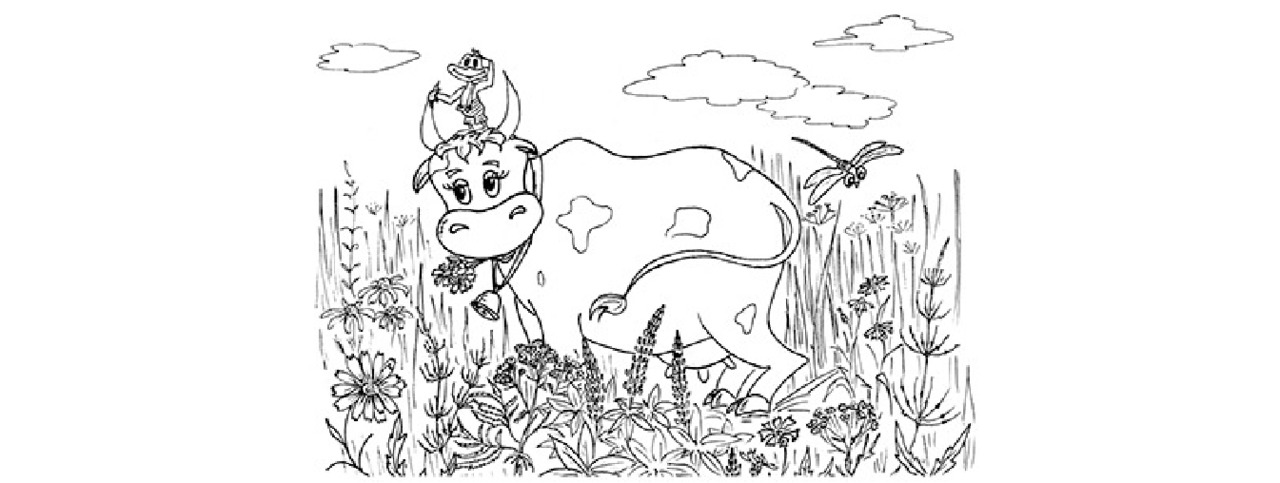
The little frog was not afraid of the big horns, because he understood: the cow is kind. He jumped on the cow’s neck and then got on its back.
The cow’s back was very high above the ground, but the grass was also very high, and the frog could not see anything. The cow understood this and said:
“Get on my head: it’s even higher.”
The frog climbed on the cow’s head and sat down between the horns, and the cow began to turn her head in different directions. Now everything was visible, and the little frog noticed the familiar reeds.
The cow was big, and her steps were wide: the frog and the cow reached the place very quickly.
The cow tilted her head to the river, parted the reeds with her muzzle and saw a whole family of frogs on the leaves of water lilies. The frogs also saw a large cow’s muzzle, but they were not afraid: this muzzle was kind.
The little frog was delighted. It rolled down the cow’s head on the nearest water-lily, and the whole frog family, in gratitude to the cow, sang the evening song: “Croak-croak, croak-croak, croak-croak…”
The cow smiled and went home. At home fed she the calves and gave milk to the mistress for her little children and for the neighbor’s little children. There was always a lot of milk, because the cow was very kind.
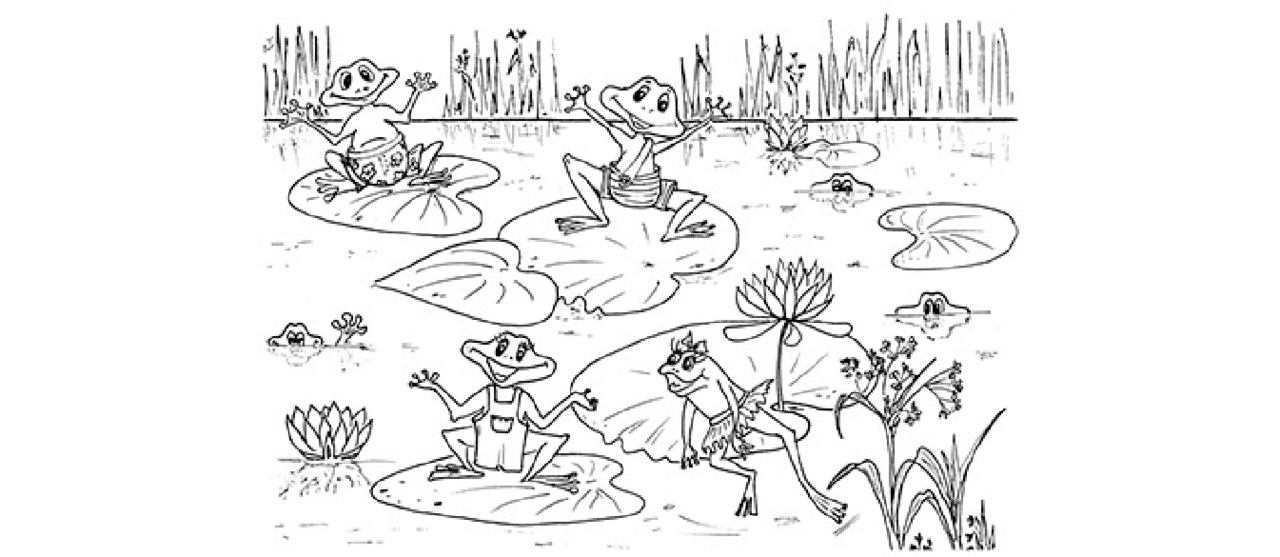
The Adventures of the Rubber Boots
Once upon a time there were rubber boots, very comfortable. They were made of real rubber, not soft plastic. The owner loved them, every weekend he went with them to the forest and the river: for mushrooms, berries or fishing. And when the rain made the roads muddy, he wore them on weekdays. And how he looked after them! He washed and dried them with a soft cloth: the boots also loved their owner.
Once the owner went to the south to rest, but did not take the boots: why does the owner need boots where it is always dry and sunny. The boots were sad, pined for a few days and decided to fly after the owner. They got out of the closet into the corridor, out of the corridor into the street, got on the bus and arrived at the airport. They stood in line for the right flight and heard people were asked for tickets. And the boots didn’t have a ticket: what kind of ticket can boots have? They went to the place where the luggage is loaded on the plane, stomp-stomp-stomp, climbed into a suitable bag and got into the luggage compartmen. People go with people, and things – with things. The boots looked out of the bag, and saw around suitcases, suitcases, other bags, bags, backpacks… As soon as they begin to gain altitude, there was a tapping and oohing from the next suitcase: “Ooh, ooh, ooh!”
“Who’s there?” asked the boots.
“This is us, Semyonovsky matryoshka dolls, and who are you?”
“We are the rubber boots. What are you oohing about?”
“We are bumping each other… and we have our ears blocked.”
“What kind of ears do nesting dolls have?”
“They are drawn… Ears are under the handkerchiefs.”
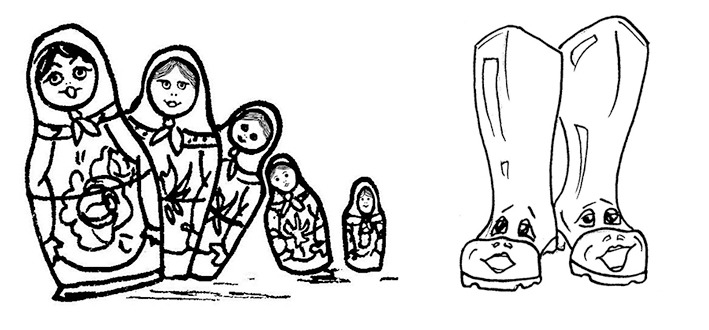
The boots remembered the matryoshka dolls in their master’s sideboard: they were one smaller than the other, all dressed up, painted, in handkerchiefs, shiny, varnished. And then the boots asked:
“Where are you travelling to?”
“We are going to visit the relatives of our owners, Petya and Masha. They were given two sets of Matryoshka dolls for their wedding, so they are took one set of them to re-gift. At the same time they want to relax by the sea. Where are you travelling to?”
“We are looking for the owner: he also went to the sea.”
“Hee-hee-hee,” laughed Matryoshka dolls, “how can you find a person in a big resort city?”
“We don’t know… somehow…”
Then the plane hit an air hole, and the nesting dolls began to rattle and oohing again. The boots felt for a moment as if they were falling down, then they were pinned to the bottom of the bag, and then the plane leveled off, and the boots wondered how they were going to find their owner. They thought and thought and decided: if they don’t find it, they will go home.
All the way the boots talked to the nesting dolls. Matryoshka dolls told how toys and dishes are made from Linden logs in the old beautiful Semenov city. First the work pieces are made on a lathe or using special knives, then they are soaked in oil, dried, the dishes are covered with tin powder, painted with bright colors, and varnished… Such elegant things turn out! People say: “It’s nice to use them yourself, and it’s a great gift.”
When there were air holes on the way, the nesting dolls clattered, oohed, forgot everything they told, and started to tell over with new details. The boots liked it very much.
The plane arrived in the southern city, our fellow travelers said goodbye, and boots, stomp-stomp-stomp, went to look for the owner. They went to the beach first. There were multicolored flip-flops on the shingle on the beach.
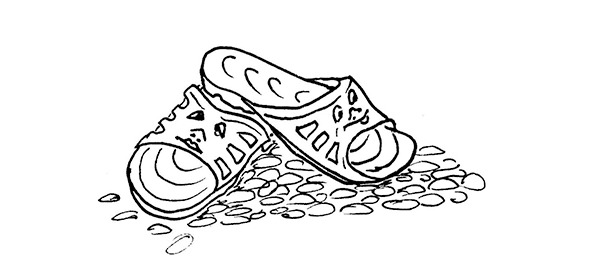
The flip-flops were squinting contentedly and smiling at something.
“Hello,” said the boots, “where are you from?”
“From the far North,” the flip-flops replied, still squinting and smiling. “We are with the owner for a whole month here! There he is bathing.”
“We’re looking for our owner,” sighed the boots. “Have you seen my owner around here?”
The flip-flops stopped squinting and looked at the rubber giants.
“No, we haven’t seen him. Why didn’t he take you with him?”
“Why does he need us here?”
“That’s right. Our man didn’t take felt boots or high fur boots to this place. Where are you from?”
“We are from the middle latitudes. We often have cold rains, dampness, slush and all that…”
“Clear,” said the flip-flops, “it’s cold in our place in winter and summer… You can look for in the hotel.”
The boots thanked their collocutors and went to the hotel. There were men’s sandals at the entrance. The barefooted proprietor sat in a wicker chair beside them.
“Good afternoon,” the boots said to the sandals. – We’re looking for our master.” Have you seen him?”
“Are you lost?” answered sandals lazily a question on a question, not looking at the boots.
“No. He just didn’t take us with him…”
“Well, why did you come here? Why can’t you stay at home?”
“We missed our owner…”
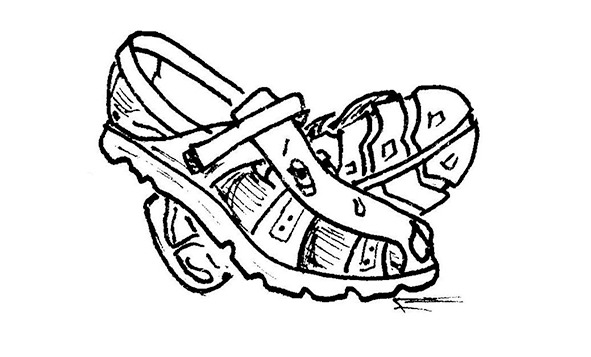
“This is stupid,” the sandals grumbled, casting a quick glance at their collocutors. “Your master is not here. Look for in the private sector.
“Thank you,” the boots said, and started walking toward the two-story houses.
In the very first house, a pair of old, worn-out women’s shoes with small heels stood on the porch.
“Good day! Sorry to bother you, have you met our host?”
“My dears,” said the shoes good-naturedly, “we can’t keep in mind all the people around. What does your owner look like?”
Бесплатный фрагмент закончился.
Купите книгу, чтобы продолжить чтение.
